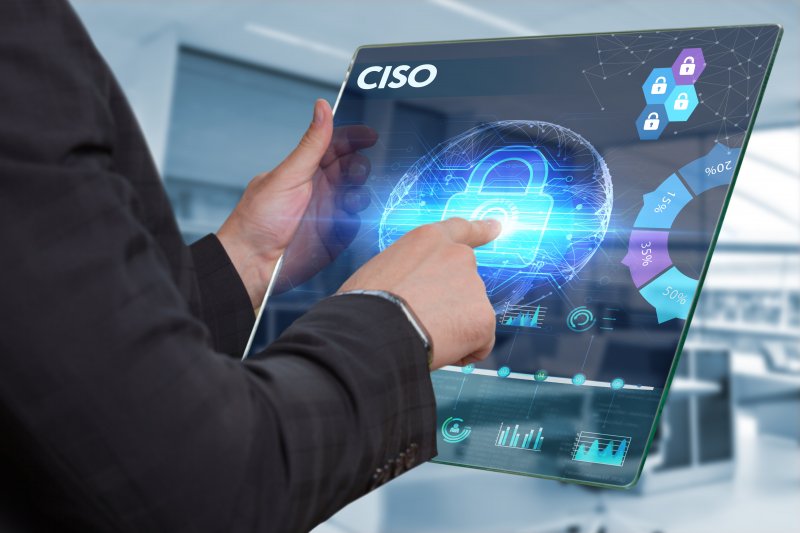What’s the difference between a CISO and CIO, and what does it mean for your business?
There are many similarities between the two, but there are some distinct differences that distinguish them.
We take a look at the difference between CISOs and CIOs and the impact they can have on your business.
What Does a CIO Do?
CIO stands for Chief Information Officer, and they’re typically the highest ranking person in a company when it comes to IT.
This means the CIO has to have a broad knowledge of lots of different areas of IT infrastructure. Essentially, they play a part in every IT team, strategizing to bring IT policies in line with company goals.

They will communicate decisions directly to stakeholders, and be responsible for making sure IT is working toward bringing company goals to fruition.
The key difference between a CIO and CISO (which we will talk about in a second), is the scope of the job. While they’re both high-ranking C-suite positions, a CIOs job is much more generalist. They need to have an understanding of how every part of IT infrastructure fits into the business, which is in contrast to CISOs who are much more focused on security.
What Does a CISO Do?
So, if a CIO is responsible for all IT infrastructure, then what does a Chief Information Security Officer do?
The key difference here is scope.
A CISO is fully focused on security. They’re not involved in day-to-day IT strategy decisions unless they pertain to security.
This means CISOs need much more specialized knowledge with a focus on cybersecurity frameworks.
Both positions are essential to the running of a modern enterprise business because of the importance of IT. On the one hand, IT infrastructure can facilitate business growth (CIO), but on the other, it can also open businesses up to security risks (CISO).
Naturally, there is going to be some crossover between the two positions. Security will play a part in the decisions a CIO makes, and growth will pay a part in the decisions a CISO makes, so the two have to work together to help the business realize its goals.
CIO and CISO Responsibilities
We’ve looked at some differences between CIOs and CISOs but what about their responsibilities?
As we said, there will naturally be some crossover between the responsibilities of CIOs and CISOs, but for the most part they’re quite distinct.
CIO Responsibilities
- Developing departmental goals
- Managing IT staff
- IT budget oversight
- Planning and managing IT systems and operations
- Planning software development
- Developing IT policies, procedures, and best practices
- Keeping up with IT trends and best practices
- Aligning IT strategies with company goals
- Managing relationships with vendors
- Reporting to the board of directors
You’ll see that these responsibilities are quite broad and take in every aspect of enterprise IT. This is the key difference between a CIO and CISO, as you can see from the CISO’s responsibilities.
CISO Responsibilities
- Overseeing an organization's cybersecurity program
- Aligning cybersecurity with business objectives
- Cybersecurity reporting
- Monitoring incident response activities
- Managing business continuity and disaster recovery
- Promoting cybersecurity awareness and training
- Overseeing cybersecurity personnel
- Managing vendor relationships
- Maximizing cybersecurity budget
As you can see, many of the responsibilities are similar in nature, but a CISO is much more focused on security.
Naturally this leads to the two being mixed up sometimes, but they are distinct jobs with their own responsibilities.
Where Should a CISO Report?
CISOs report to different people depending on the structure of an organization.
In some business models, a CISO will report directly to the CIO, but this isn’t always the case. While CIOs and CISOs will naturally work closely together, CISOs more often than not will report to the CEO.

This is because of the importance of cybersecurity.
It isn’t something that just the CIO should be concerned about, it’s something that pertains to every part of business. It’s central to an organization's business strategies, and for this reason, it needs to be overseen by those at the very top.
Sometimes the relationship between a CIO and CISO can be tricky because of the overlapping nature of their positions, but it’s important they’re both empowered to do their work to the best of their ability.
How Does a Virtual CISO Fit In?
Modern businesses require a wide-variety of skill sets.
There are lots of different departments and even within those departments there are specialist teams. This is summed up by the fact that many businesses need a CIO and a CISO.
The problem is, many businesses simply don’t have the resources to fill both positions internally.
So, they turn to an alternative option which is a virtual CISO.
A virtual CISO allows you to access an experienced professional to help develop and manage your cybersecurity program. This allows businesses to pay for the work they need, without taking someone on on a full-time basis.
A virtual CISO can mean you get a more experienced practitioner while keeping expenses down. You pay for the work you need, and nothing more, so you’re getting the best value for money.
The flexibility a virtual CISO offers makes it a very popular option for many businesses.
Hiring a Virtual CISO
A virtual CISO can provide the best of both worlds for your business.
The difference between a CIO and a CISO might be small, but modern businesses do need the dedicated security expertise a CISO offers. The problem is, there’s tons of competition for these practitioners, and many businesses can’t afford a full-time hire.
So, what’s the answer?
The best way to improve your cybersecurity is by hiring a virtual CISO through Stickman Cyber Security.
Our experts have years of industry experience, and know how to protect your business.
Learn how to get a dedicated Virtual CISO to strategise, manage and optimize your cybersecurity practice.
Learn more and contact StickmanCyber today.